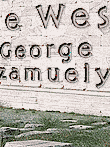Don’t
believe media guff about NATO’s supposed opposition to Montenegrin
secession. Why shower Djukanovic with economic favors while
maintaining sanctions against the Serbs? Why insist he adopt
the D-Mark as the local currency? But then we are regularly
asked to believe that US policymakers want Serbs to stay
in Kosovo. For some reason though, the Greatest Power on
earth has no control over its clients, the KLA, which even
UN Secretary General Kofi Annan says is conducting an "orchestrated
campaign" to drive out the Serbs. The breakup of the
Balkans into tiny satellite-states remains NATO’s policy.
Its most fervent champion has been today’s most articulate
advocate of the American Empire – former National Security
Adviser Zbigniew Brzezinski. Brzezinski is a ubiquitous
presence on the American scene. He pioneered a genre of
foreign policy in which entities like the "United States,"
"Europe," "Russia" and "China"
play meaningless games of chess for influence and power.
There is rarely a debate on US foreign policy that is not
graced by his taut face, his harsh Polish accent, and his
tough, no-nonsense pro-Americanism. His scholarly reputation,
his facility with geopolitical pomposities, not to mention
his extraordinary productivity ensure that he is treated
with hushed respect wherever he goes. He is said to be the
hideous harridan’s intellectual guru.
The
summer issue of the National Interest contains the
second installment, entitled "Living
with a New Europe," of a trilogy of essays on the
current global condition. The article is typical of Brzezinski’s
work in that it rarely rarely rises above the simple-minded
"We’re number 1!" posturing of the Wall Street
Journal editorial page. Brzezinski wants NATO expansion;
US global dominance; Russian subordination; and NATO operating
"out of area," particularly in the region he calls
"the Eurasian Balkans" – the area that extends
from the Eastern shore of the Black Sea to China, and includes
the Caspian Sea with its oil and gas resources. Currently,
he is a consultant to BP Amoco, which has extensive oil
interests in the Caspian. According to Counterpunch,
Brzezinski recently described Azerbaijan dictator, the repulsive
Heydar Aliyev as a "real cool cat." Zbig, however,
likes to sugarcoat real material interests with grand phrases
about "democracy," "regional stability,"
and the "American-European connection." Brzezinski
was, of course, a passionate advocate of war against Yugoslavia
last year. He was one of the earliest to demand a ground
invasion. He urged independence for Kosovo. "If a country
is itself unstable, because some significant portion of
it is highly dissatisfied with the existing country,"
he argued in an interview last year, "then there is
no point in artificially insisting that such a country be
maintained because of a respect for borders or because of
the fear of change" – hardly a recipe for "regional
stability" and one not to be prescribed for Southern
California or South West Texas. As for Montenegro, "If
Montenegro and Serbia cannot work well together in some
sort of a federation, then obviously the dissolution of
these links makes more sense."
In
the National Interest, he informs us with delight
that Europe is a "de facto military protectorate
of the United States." He admits that "this situation
necessarily generates tensions and resentments," but,
hell, the Europeans will just have to lump it because "the
existing asymmetry in power…is likely to widen even further
in America’s favor….And that in turn means that America
in all likelihood will also remain the dominant partner
in the transatlantic alliance for the first quarter of the
twenty-first century." Brzezinski can barely disguise
his contempt for Europe. He accepts that it is hard to get
those obstreperous Europeans to get with the American program.
So US policymakers should throw them a few bones. If the
Europeans want to fantasize about rivaling the United States,
let them. They are so far behind us militarily, economically
and technologically that we have very little to fear from
them. "I do not think the Europeans, for all of their
talk, will in fact do very much to change the relationship.
They do not have the political will, they do not have the
inclination to make the necessary sacrifices….I do not expect
a major change in the reality of the American-European relationship,"
he explained last year. So if the Europeans want a little
bit of self-respect, Washington should not stand in the
way. To be sure, it would be nice if Europe were a "dedicated
member of NATO…willing to have NATO act ‘out of area’ in
order to reduce America’s global burdens; and remaining
compliant to American geopolitical preferences regarding
adjacent regions, especially Russia and the Middle East."
But Europe will not be a problem either. US policymakers
should stop carping about the European Security and Defense
Initiative. It will not amount to much anyway. "What
credible scenario can one envisage in which it could act
decisively, without advance guarantees of NATO support and
without some actual dependence on NATO assets?" Brzezinski
asks sarcastically. He imagines a scenario in which Montenegro
secedes from Yugoslavia and Milosevic sends in his armed
forces. "Without US participation, the planned European
force would probably be defeated," he snorts.
So
NATO is here to stay. But what exactly is it supposed to
do? Brzezinski mumbles vaguely about alleged threats to
Europe: "The European polity, situated on the western
edge of Eurasia and in the immediate proximity of Africa,
is more exposed to the risks inherent in rising global tumult
than the politically more cohesive, militarily more powerful
and geographically more isolated America." He tries
flogging the dead horse of a threat from the East. "The
Europeans will be more immediately at risk if a chauvinistic
imperialism should again motivate Russian foreign policy."
But his heart is not really in it. He has something else
in mind. Brzezinski has said many times before that the
goal of US policy should be "to perpetuate America’s
own dominant position for at least a generation and preferably
longer still." Hence the need for NATO expansion. Testifying
before the Senate Foreign Relations Committee in 1997, Brzezinski
explained that NATO’s enlargement was not about security
at all. It was "about America’s role in Europe –
whether America will remain a European power and whether
a larger democratic Europe will remain organically linked
to America." It was also about Russia’s relationship
to Europe, "whether NATO’s enlargement helps a democratizing
Russia by foreclosing the revival of any self-destructive
imperial temptations regarding Central Europe." And
it was also about bringing "into NATO counsels new,
solidly democratic and very pro-American nations."
Zbig makes no bones about it – NATO enlargement is
about the expansion of the American empire. Proof that Russian
democracy is viable will come when it lies down abjectly
before NATO. If it refuses to do so, that will be proof
for the necessity of NATO. As for the new members of NATO,
they will be so grateful to the Americans that they will
counter the malign anti-American influence of the French.











